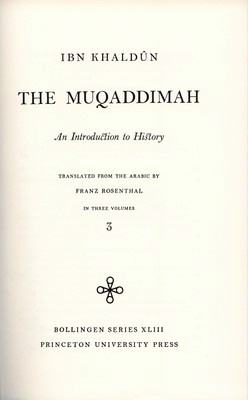Volume Three
Chapter VI
[12] Jurisprudence and its Subdivision ...
"Jurisprudence is the knowlege of the classification of the laws of God, which concern the actions of all responsible Muslims, as obligatory, forbidden, recommendable, disliked, or permissible. These (laws) are derived from the Qur 'ân and the Sunnah (traditions), and from the evidence the Lawgiver (Muhammad) has established for knowledge of (the laws). The laws evolved from the (whole) of this evidence are called "jurisprudence" (fiqh).
The early Muslims evolved the laws from that evidence, though, unavoidably, they differed in (the interpretation of) it. The evidence is mainly derived from texts. The texts are in Arabic. In many instances, and especially with regard to legal concepts, there are celebrated differences among them as to the meaning implicit in the words. Furthermore, the traditions (Sunnah) differ widely in respect of the reliability of the recensions. Their legal contents, as a rule, are contradictory. Therefore, a decision is needed. This makes for differences of opinion. Furthermore, evidence not derived from texts causes (still other) differences of opinion. Then, there are new cases which arise and are not covered by the texts. They are referred by analogy to things that are covered by the texts. All of this serves to stir up unavoidable differences of opinion, and this is why differences of opinion occurred among the early Muslims and the religious leaders after them.
Moreover, not all of the men around Muhammad were qualified to give legal decisions. Not all of them could serve as sources for religious (practice) ..." (op. cit., ibid., Vol. III, p. 3)
[13] The Science of the Principles of Jurisprudence ...
"Then, we looked into the methods according to which the men around Muhammad and the early generations made their deductions from Qur' ân and Sunnah. It was found that they compared similar (cases) and drew conclusions from analogy, in that they either all agreed or some of them made concessions in this connection to others. Many of the things that happened after the Prophet are not included in the established texts. Therefore, they compared and combined them with the established indications that are found in the texts, (and drew their conclusions from analogy) according to certain rules that governed their combinations. This assured the soundness of their comparison of two similar (cases), so that it could be assumed that one and the same divine law covered both cases. This became (another kind of) legal evidence, because the (early Muslims) all agreed upon it. This is analogy (qiyâs), the fourth kind of evidence. The great mass of religious scholars is agreed that these are the four basic kinds of evidence. Some scholars differed on the matters of general consensus and analogy. But this is exceptional. Others added further kinds of evidence to the four. We do not have to mention them here, because the basis (upon which they rest) is weak, and they are rarely reffered to. The first task of this discipline is to study the (right of) existence of the four kinds of evidence.
(1) Proofs for the Qur' ân are the decisively miraculous, (inimitable) character of its text, and the general continuity of its transmission. This leaves no room for any doubt.
(2) The Sunnah, as it has been transmitted to us, it justified by the general consensus (to the effect) that Muslims must act in accordance with traditions that are sound, as we have mentioned before. This is supported by Muhammad's practice, during his lifetime, of sending letters and messengers to the various regions with legal and religious commands and prohibitions.
(3) The general consensus is justified by the fact that men around Muhammad had agreed to disapprove of those who held opinions different from theirs. In addition, there is the established infallibility of the Muslim nation (as a whole).
(4) Analogy is justified by the general consensus of the men around Muhammad concerning its (admissibility), as we have mentioned before.
These are the basic kinds of evidence.
The transmitted traditions of the Sunnah need verification through an investigation of the ways of transmission and the probity ('adâlah) of transmitters, so that the likelihood of the truthfulness of the transmitted information, which is the basis for the necessity to act in accordance with it, becomes clear. This also is one of the basic subjects of the discipline. Added to this is the knowledge of abrogating and abrogated traditions, when two traditions are mutually contradictory and the earlier one of the two is sought. This, too, is another subject of the discipline ..." (op. cit., ibid., Vol. III, pp. 24-25)



